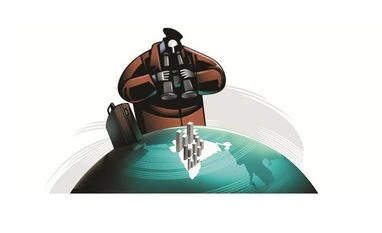Standard & Poor’s (S&P) on Thursday retained India’s ratings at lowest investment grade of BBB- with stable outlook as the economy’s fiscal position remains weak, which hampers consolidation over the next few years.
In a statement, S&P said tight credit conditions remained in the financial sector that would hamper growth in private consumption over the coming quarters.
However, factors affecting economic expansion are cyclical trends and the economy retained its structural growth performance, it said. As such, it believes the economy to gradually recover to its long-term trend over two to three years.
The stable outlook on India's ratings reflects agency's view that the economic growth will stabilise and begin to recover from its current low ebb and fiscal deficits will remain elevated but broadly in line with forecasts over the next two years.
Ratings could be upgraded if the government significantly curtails its fiscal deficits, resulting in lower net indebtedness at the general government level. It could also be due to any substantial strengthening of India’ external accounts.
Ratings could be downgraded if India’s GDP growth falls well below the agency’s forecasts, net general government deficits rise further from their currently elevated levels. or political developments materially undermine economic reform momentum.
S&P said the ratings reflected the country's above-average GDP growth, sound external profile, and evolving monetary settings. Also, India’s strong democratic institutions promote policy stability.
These strengths are balanced against vulnerabilities stemming from the country's low per capita income and consistently elevated fiscal deficits that contribute to high general government debt, net of liquid assets.
It expects the growth rate to improve to 6 per cent during FY21, from expected 5 per cent in the current fiscal year and 7 per cent in the next fiscal year and 7.4 per cent thereafter. “We expect India’s economy to continue to outperform peers at a similar level of income, despite a recent slowdown in real GDP growth,” it said.
The agency noted that tighter lending conditions continue across the financial system, particularly in the public sector. This, it said, is reflected in a gradual decline in credit growth.
In combination with ongoing liquidity concerns in the non-banking financial institution (NBFI) sector following the September 2018 default by Infrastructure Leasing and Financial Services (IL&FS) and subsequent relatively less impactful defaults, domestic credit conditions have been somewhat mixed, it said.
“Weaker sentiment in the NBFI space may limit private consumption growth over the coming quarters,”it said.
The government's August 2019 announcement that it would consolidate major public sector banks may also constrain credit growth over the next 12-24 months, it said.
“Nevertheless, we believe India is experiencing a cyclical, rather than a structural, economic slowdown. The economy’s long-term outperformance highlights its resilience. “India’s wide range of structural trends, including healthy demographics and competitive unit labor costs, works in its favour. A more favourable corporate tax regime, which is particularly supportive of manufacturing firms, should reinforce growth, alongside additional fiscal and monetary easing,” it said.
The agency said India’s economic growth faces headwinds over the near term, including subdued private sector investment and sentiment, labour market difficulties, and soft demand conditions.
However, it believes the country’ long-term outperformance will remain intact.
India's fiscal deficits will be higher in this fiscal year and the next, largely due to the economic slowdown and substantial cuts in corporate taxes, it added.
The Indian government’s fiscal 2020-21 Budget acknowledges a rise in the central government'’s deficit to 3.8 per cent in 2019-20, and expects the deficit to fall marginally to 3.5 per cent next year.
S&P said the general elections held in April-May 2019 returned a robust mandate for Prime Minister Narendra Modi’s BJP-led government.
“The results suggest that major policy undertakings by the government in its first term, including GST and demonetisation, have not materially undermined support for the BJP-led coalition,” it said.
Over the next one to two years, this electoral support could encourage the government to pursue further reform initiatives, especially those aimed at liberalising foreign investment.
Unlock 30+ premium stories daily hand-picked by our editors, across devices on browser and app.
Pick your 5 favourite companies, get a daily email with all news updates on them.
Full access to our intuitive epaper - clip, save, share articles from any device; newspaper archives from 2006.
Preferential invites to Business Standard events.
Curated newsletters on markets, personal finance, policy & politics, start-ups, technology, and more.
)